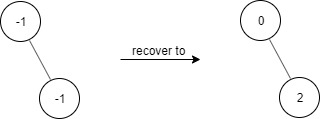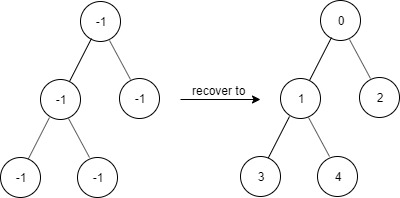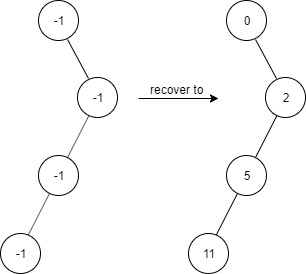LeetCode-in-Java
1261. Find Elements in a Contaminated Binary Tree
Medium
Given a binary tree with the following rules:
root.val == 0- If
treeNode.val == xandtreeNode.left != null, thentreeNode.left.val == 2 * x + 1 - If
treeNode.val == xandtreeNode.right != null, thentreeNode.right.val == 2 * x + 2
Now the binary tree is contaminated, which means all treeNode.val have been changed to -1.
Implement the FindElements class:
FindElements(TreeNode* root)Initializes the object with a contaminated binary tree and recovers it.bool find(int target)Returnstrueif thetargetvalue exists in the recovered binary tree.
Example 1:

Input [“FindElements”,”find”,”find”] [[[-1,null,-1]],[1],[2]]
Output: [null,false,true]
Explanation:
FindElements findElements = new FindElements([-1,null,-1]);
findElements.find(1); // return False
findElements.find(2); // return True
Example 2:

Input [“FindElements”,”find”,”find”,”find”] [[[-1,-1,-1,-1,-1]],[1],[3],[5]]
Output: [null,true,true,false]
Explanation:
FindElements findElements = new FindElements([-1,-1,-1,-1,-1]);
findElements.find(1); // return True
findElements.find(3); // return True
findElements.find(5); // return False
Example 3:

Input [“FindElements”,”find”,”find”,”find”,”find”] [[[-1,null,-1,-1,null,-1]],[2],[3],[4],[5]]
Output: [null,true,false,false,true]
Explanation:
FindElements findElements = new FindElements([-1,null,-1,-1,null,-1]);
findElements.find(2); // return True
findElements.find(3); // return False
findElements.find(4); // return False
findElements.find(5); // return True
Constraints:
TreeNode.val == -1- The height of the binary tree is less than or equal to
20 - The total number of nodes is between
[1, 104] - Total calls of
find()is between[1, 104] 0 <= target <= 106
Solution
import com_github_leetcode.TreeNode;
import java.util.HashMap;
/*
* Definition for a binary tree node.
* public class TreeNode {
* int val;
* TreeNode left;
* TreeNode right;
* TreeNode() {}
* TreeNode(int val) { this.val = val; }
* TreeNode(int val, TreeNode left, TreeNode right) {
* this.val = val;
* this.left = left;
* this.right = right;
* }
* }
*/
public class FindElements {
private final HashMap<Integer, Integer> map = new HashMap<>();
public FindElements(TreeNode root) {
helper(root, 0);
}
private void helper(TreeNode root, int x) {
if (root == null) {
return;
}
root.val = x;
map.put(x, 0);
helper(root.left, 2 * x + 1);
helper(root.right, 2 * x + 2);
}
public boolean find(int target) {
return map.containsKey(target);
}
}
/*
* Your FindElements object will be instantiated and called as such:
* FindElements obj = new FindElements(root);
* boolean param_1 = obj.find(target);
*/

